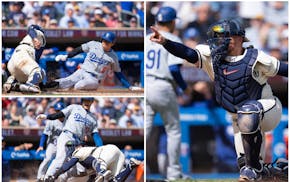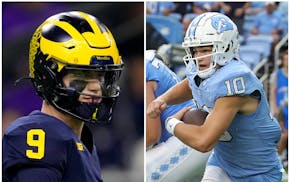WINSTON-SALEM, N.C. – Bob Ryan is 72 and has been officially retired as a sportswriter since 2012, except he still writes several Sunday columns every month for the Boston Globe, makes regular TV and radio appearances on ESPN and hosts his own podcast.
"I'm just an observer," he said. "It seems all I'm doing is watching sports."
He didn't offer that as a complaint. Ryan was relaxing inside a hotel lobby, a Hall of Fame sportswriter talking shop about the state of his profession. He's here to present his friend Dick "Hoops" Weiss, who was inducted into the National Sports Media Association's Hall of Fame on Monday night.
NSMA honored writers and broadcasters from all 50 states at its annual banquet — somehow, my name got pulled out of the hat — and a few of the industry's giants, including Ryan, Bryant Gumbel and Thomas Boswell.
Ryan and Weiss are two of the most respected basketball writers in the history of sportswriting. Ryan became known as a master storyteller in his coverage of those championship Celtics teams of Bird, McHale and Parish.
Journalism operated much differently back then. Ryan had intimate access to players and coaches and was able to see behind a curtain that often serves as a barrier stopping the flow of insight and information today.
We chatted for a few minutes about the challenges of covering sports in the age of Twitter and shifting media climate. Afterward, I couldn't help but reflect on how the NBA that Ryan chronicled for decades also has changed substantively with the proliferation of superteams.
Except the superteam model really isn't new.
The league's history is built upon dynasties (Celtics, Lakers, Pistons, Bulls, Spurs). Nostalgic acceptance exists in those cases because they occurred more organically and weren't orchestrated by stars constructing their own superpowers.
That's the crux of negative perceptions about the NBA now.
Even die-hard fans will admit that the most recent NBA Finals were less satisfying than a dinner plate of saltine crackers after Game 1. The LeBron Cavaliers were no match for one of the greatest teams ever assembled, the Golden State Warriors.
The NBA isn't broken, though, or ruined by superteams, a narrative that continues to be voiced with the Warriors' inevitable repeat as champions and anticipation of more star shopping this offseason.
The NBA no doubt has changed, but stripping away predictability as a result of stars joining forces doesn't make the product less interesting. It's just a matter of taste and preference.
True, even casual observers of the league could have predicted Round 4 of Warriors vs. Cavs before the season began. In a sport where individual talent rules, no team can match Golden State's firepower since Kevin Durant arrived to win a ring. And LeBron James could drag a team of middle-aged YMCA hoopers to the Finals in the weaker conference, the East.
Yet NBA ratings continue to be robust, even as critics bash the league's lack of suspense, because stars are attractive to audiences who enjoy story lines and basketball being played at the highest level.
The Warriors are entertaining, not because fans know they will win, but because of how they play and the idea that their collection of talent is something historically unique.
No sports league markets its stars better than the NBA. Stars become their own brands and mini-corporations. Star power drives TV ratings, creates story lines and even fuels animosity, which also sells, because people love to root against perceived villains.
Fans — particularly kids who comprise a large and desirable audience as consumers of shoes/apparel — identify more with individual stars than with specific teams. The guess here is that many Kyrie Irving fans switched allegiances and bought Boston Celtics gear once he changed teams. Whatever team LeBron picks in the next few weeks will automatically become a winner in ratings and jersey sales. That's just how the league works nowadays.
That might be a turnoff to some, but it's not necessarily bad for business.
Scoggins: 'Wait one more year' can't be the Wild's plan. Thankfully, it isn't.

Scoggins: Finch feeling heat of the Suns as playoff battle looms
Scoggins: Why 'championship or bust' fits these Wolves

Scoggins: Anatomy of a game-saving play as Correa throws out Ohtani


